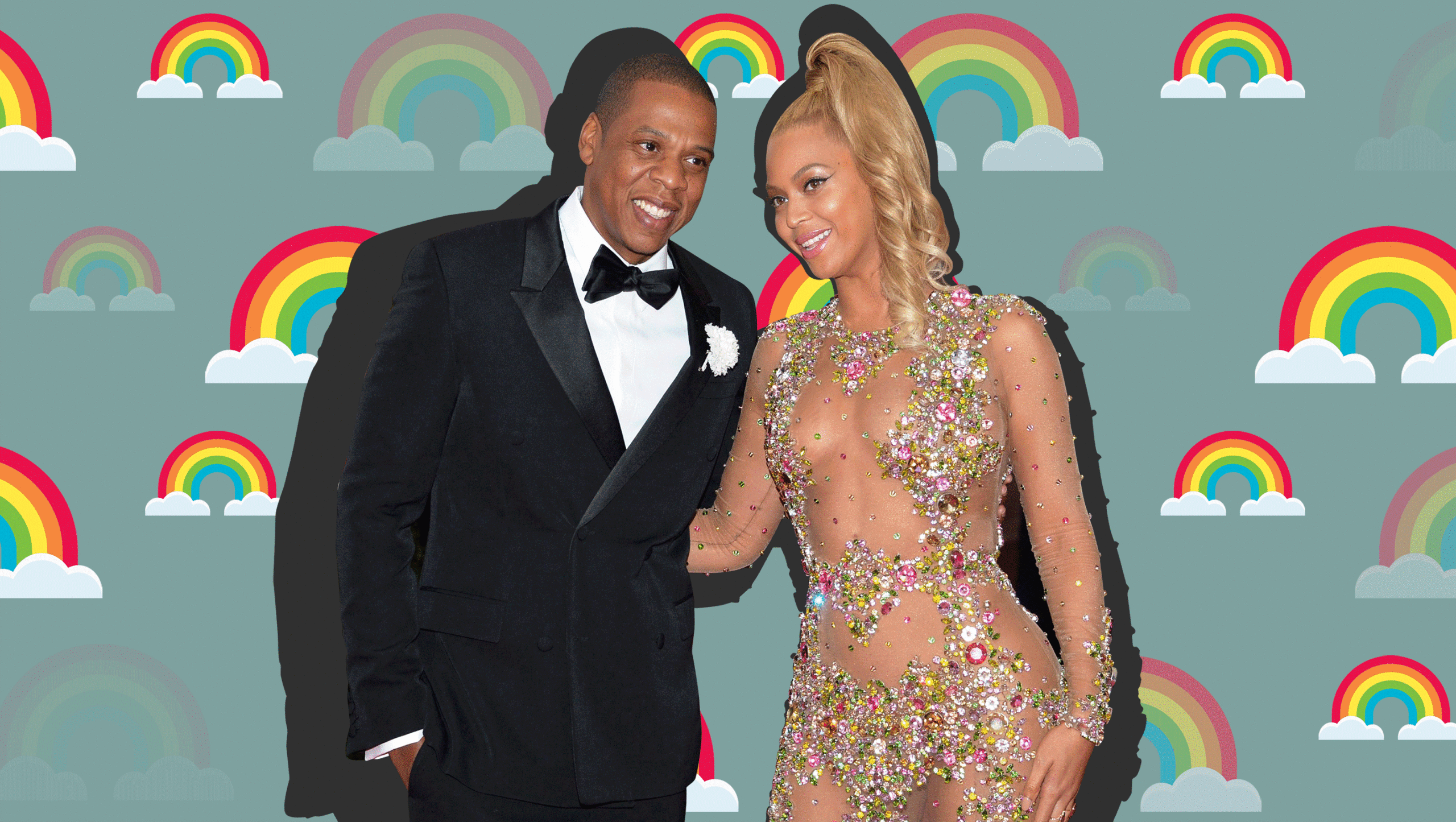Each year, at a glitzy Hollywood ceremony, the GLAAD Media Awards doles out honours to entertainers who provide representation to LGBTQ2 communities and our causes. But it’s not just members of these communities who get love.
The annual Vanguard Award is given to straight and cis allies who made a significant difference in promoting acceptance of queer and trans folks. This year’s recipients are Beyoncé and Jay-Z.
The Carters are being recognized for their inclusion of LGBTQ2 people in their music videos and songs and their support of same-sex marriage.
But should a major queer organization like GLAAD celebrate straight and cis people? The Xtra team has a lot of feelings.
Together, we unpack the awards and the place of allies in LGBTQ2 communities.
Erica Lenti, senior editor: When I think of Beyoncé and Jay-Z, “queer allies” is not what immediately comes to mind. I think first of their dedication to empowering Black communities — the way Beyoncé’s Lemonade uplifted Black feminism and challenged police violence against Black people, or the ways in which Jay-Z has helped break the stigma around Black folks seeking mental health care. They’ve done a lot for communities of colour.
That said, their work with LGBTQ2 communities has been fairly surface-level. Beyoncé dedicated a performance to communities in plight after the Pulse Orlando shooting, and Jay-Z supports same-sex marriage, particularly after his mom came out as a lesbian. It’s great, but does it warrant an award? Is that all it takes to dub someone an ally? It’s hard to see this as active participation in the bettering of queer and trans existence. If it were up to me, I’d skip past allies’ basic acts of kindness and care toward LGBTQ2 people and just . . . reward the LGBTQ2 people doing great things.
Arvin Joaquin, associate editor: Okay, a disclaimer: I adore Beyoncé and one should not speak ill of the queen. However, I never considered her as an ally — maybe an icon, but an ally seems like a stretch.
And Jay-Z. Aside from having a lesbian mom and crying when she came out to him, I don’t know any monumental thing he did that qualifies him to be someone worthy of an award. Sure, he cried. Sure, he showed acceptance. But is that enough to be acknowledged and named a vanguard of queer communities? I’m not questioning the Carters’ stance as supporters of LGBTQ2 people, but giving them this award feels like a desperate move to associate our causes with famous folks.
EL: That’s really what it seems like, right? We know Beyoncé and Jay-Z hold a lot of clout — and we know they have huge fan bases — and they therefore become faces of awards where perhaps others (read: queer and trans people) should be getting more visibility.
Meanwhile, Madonna is winning the Advocate for Change Award! Yes, she’s been a long-time supporter of queer folks, especially through the AIDS crisis — but let’s not forget she’s just as guilty of queerbaiting and using our communities for her commercial gain. Do these organizations just collect artists they know queer people love and throw awards at them?
AJ: That’s a valid point. I think there’s no doubt that the Carters and Madonna are icons. But I think we need to unpack this and spell out what differentiates an icon from an ally.
Eternity Martis, senior editor: I think a straight celebrity can be both a queer icon and an ally, especially if they know that they’re a queer icon — think Mariah Carey, Barbra Streisand, Lady Gaga, Bette Midler, Diana Ross, Cher, good ol’ Liza — but these are celebs known as divas, which primarily appeal to gay men, and gay white men at that. And some of these folks have donated to or supported queer rights, whether financially, publically or politically. But others have just been open to the reality that they have become gay icons — do we call that being an ally? Because I don’t think that’s enough.
Take Cher, for example. A gay icon, and someone who now loves to troll Trump on Twitter, especially about trans issues. But when her son Chaz transitioned, she made it all about herself and how she struggled. Her inability to accept Chaz as a trans man strained the relationship, and she’s even said in a interview that when Chaz first came out as gay, years before his transition, she had a really hard time, too.
So when you break that down even further in terms of who gets to speak on behalf of LGBTQ2 communities — namely white gay men — their icons come out on top, though to people of colour or trans and non-binary folks, these may not actually be their icons, or allies. Perhaps their allies are folks who don’t have Bey and Jay–type clout, but because their voices and opinions are excluded and de-valued in mainstream opinion, we continue to pick the low-hanging fruit of the most popular gay icon celebrities then reward them as “allies” for doing things they already should to be good humans.
EL: You know, these awards have been around since 1993. Racist, Trump-supporting Roseanne Barr was one of the first recipients, if you can believe it. We’ve been celebrating straight and cis people doing the bare minimum — and to Eternity’s point, doing so mainly for white, gay people — for 25 years!
AJ: Not to mention, they awarded Britney Spears the same award, too! No disrespect to another queen, but does having hit songs that are loved by the gays enough to get a GLAAD award?
EL: Was she rewarded for her performance of “I’m A Slave 4 U” with that snake? I guess that was pretty gay.
AJ: I don’t know about that, but I’m pretty sure she’s not dedicating that song to LGBTQ2 causes.
EM: Also, has anyone ever noticed that a white girl sang a song called “I’m a Slave 4 U?” Yikes.
Anyway, that’s off topic. So a straight couple winning an award for queer contributions from an organization that supports queer representation. I think there are a number of problems with this, and the biggest for me is who has access — financially and representation-wise — to provide significant contributions. First off, Beyoncé and Jay-Z are one of the richest couples in the world. And since the majority of celebrities making millions of dollars are heterosexual — and Jay and Bey are individually super rich and have a combined worth of 1.255 billion dollars — they clearly have more disposable income to contribute to social causes — which is, in a way, a civic responsibility.
If you’re an LGBTQ2 celebrity struggling to get roles or equal pay, which is a reality for many queer celebs, but you contribute significantly to your community, you probably still wouldn’t get considered for a contribution award because you barely have enough money to get by, even though you contribute in other non-financial ways.
AJ: That’s such a good point. Especially when recent studies show more LGBTQ2 people in the US are economically disadvantaged. If you’re trying to survive yourself, how can you advocate and help others?
If you have more disposable income you’re more likely to have the opportunity to support causes. As you mentioned, Eternity, if you’re a queer celebrity who is still starting out in Hollywood, how can you advocate and support causes if you can’t even score a role or get a break to support or feed yourself?
EL: And our communities have always been built on grassroots organizing, on taking the very little we have and using it to boost the profile of our issues. LGBTQ2 people have historically not had much to work with but have always fought incredibly hard fights. To me, the folks who are doing that — especially in mainstream entertainment where we still see barriers to equality — deserve far more praise than straight and cis allies standing at the sidelines waving their “we care!” flags.
EM: I’m sure that GLAAD knows this — after all, it’s an organization that monitors LGBTQ2 people in the media as well as the disproportionate lack of representation in both characters on-screen and in the hiring of queer and trans actors, writers, directors and directors. So I question why GLAAD handing out an award to straight folks — it’s basically like when we reward men for being hands-on, present fathers, or as if we gave an award to a white person for contributing to causes related to people of colour. Again, that’s just being a good human.
Maybe handing out this award is a good way to draw attention and clout to the organization, and maybe that’s not such a bad thing? Perhaps woke straight people might pay more attention to queer and trans causes if they feel as if they’re welcomed by the community, or can be rewarded for their efforts — which is super cringey to think about but I don’t think is unrealistic. Bringing in well-known straight celebs to champion queer causes might have worked in the past, but there are many more openly queer people today for GLAAD to recognize, who are doing important work for their communities but just don’t have the same influence or status as someone like the Carters.
EL: I think what’s been irking me most about this news is how such surface-level activism has been considered worthy of an award. What does it take for Beyoncé to dedicate to Pulse survivors and victims? What does it take for Jay-Z to say he supports same-sex marriage? These celebrities risk nothing in proclaiming their support for us.
In fact, there’s been a lot of chatter about what happens when straight and cis folks are rewarded in LGBTQ2 spaces and within organizations after Manchester Pride announced Ariana Grande would be headlining its Pride this summer. It begs the question: Where do allies fit in?
AJ: I think there’s always room for allies. Our communities are built on inclusivity and embracing differences; however, I think the point of contention here is whether or not being an ally deserves recognition and if it does, then how do we evaluate worthiness? Is it on the basis of how one stands for and serves our communities or are we merely basing it on clout and hope that publicity and name association miraculously solve issues that continue to undermine LGBTQ2 folks?
EL: If that’s the criteria, then let’s revoke Bey and Jay’s awards, please. I’ve seen LGBTQ2 organizations, time and time again, undermine queer and trans folks’ importance to the greater world, and it’s so saddening. We matter, we bring important things to the world, and we can stand on our own. We don’t need A-list, straight cis celebrities vouching for how important we are to a global society. We just need to keep doing our thing.
If we’re going to celebrate allies, I’d like to celebrate those who are providing that real, on-the-ground work that actually makes a difference in the lives of everyday LGBTQ2 people. Show me an entertainer who rallies in Washington alongside trans soldiers who are facing a ban from the military and uses their platform to champion their cause. Show me an artist who starts a foundation helping queer people of colour access education and health care in places where too many barriers exist. Show me a celebrity who makes space for queer and trans performers, someone who is willing to sacrifice their own desires to uplift communities who have been shut down and left out for too long.
AJ: So I guess the question is, if you were to pick this year’s Vanguard Award winner, who would you give it to?
EL: Does it have to be a straight or cis ally? Because I can think of so many queer and trans folks that deserve some recognition. Can we like . . . cancel the Vanguard Award?
AJ: I am pro-cancellation of the Vanguard Award. Let me rephrase the question then: if you could honour someone for exceptional work that uplifts our communities, who would that person be?
EL: There are too many to pick! Janelle Monáe (who, in fairness, is up for another GLAAD Award this year), Tessa Thompson, Elliot Fletcher, Indya Moore . . .
AJ: Ah, those are great people! I’d say Marco Morante, the designer of underwear line, Marco Marco who staged a historic runway last year when he cast all trans models during New York Fashion Week! I mean, even previous GLAAD award recipient Laverne Cox acknowledged how that was a game-changer. He’s not as well-known as Bey and Jay-Z but I’d argue he did more for our communities than the Carters.
EM: I nominate Angelica Ross. She’s been so outspoken about her own journey as a trans woman and the challenges she faces as an actor. Plus, she started TransTech, a skills-based company for trans people who want to get training in order to gain employment in the industry, which has high rates of anti-LGBTQ2 discrimination. In the four years of running the company, she didn’t even get a salary, but she was so devoted to helping her community glow up that she risked it all. Give this woman the Vanguard! And give her more money!
So, is the consensus that we travel to LA and pull a Kanye like he did to Taylor Swift at the 2009 VMAs?
AJ: That or we just send a cancellation letter to end the Vanguard Awards and start a petition to reward worthy LGBTQ2 folks instead.
EL: I’m here for both!




 Why you can trust Xtra
Why you can trust Xtra


